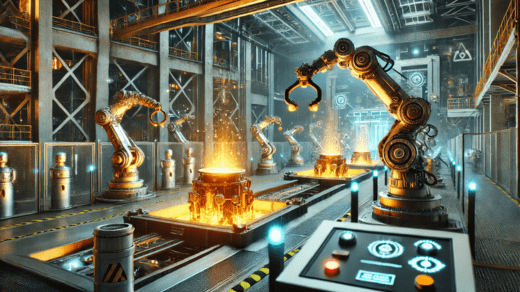Working with molten aluminum is no small feat—it’s dangerous, demanding, and requires precision. A robotics engineering company specializing in these conditions knows how to merge safety and efficiency using cutting-edge technology. This expertise ensures that both equipment and personnel are protected while maintaining high performance in extreme environments.
Heat-Resistant Materials in Robotic Components for Safety
The extreme heat from molten aluminum requires robotics designed to withstand temperatures that would damage standard equipment. A robotics engineering company in Alabama uses advanced, heat-resistant materials to construct components that remain stable and functional under these intense conditions. These materials ensure the robots maintain performance without breaking down over time.
By incorporating ceramics, specialized metals, and composite materials, these robots not only endure high heat but also minimize risks of failure. This durability is critical for maintaining consistent operations in foundries and other industrial settings. Through innovative design, these heat-resistant components protect the machinery, reduce downtime, and enhance workplace safety.
Specialized Gripping Tools for Handling High-Temperature Aluminum
Handling molten aluminum with precision requires tools capable of managing both extreme temperatures and delicate operations. Robotics engineering companies develop specialized gripping tools designed to handle aluminum in its molten state without compromising safety or efficiency. These tools provide the perfect balance of strength and precision.
The gripping mechanisms are typically made of non-reactive, durable materials that prevent damage or contamination during handling. By allowing robots to carefully and securely manage molten aluminum, these tools reduce human exposure to dangerous conditions while improving the overall quality of the finished product. This innovation ensures reliability in demanding industrial workflows.
Insulated Robotic Arms to Prevent Heat Transfer Risks
Preventing heat transfer is essential to protect robotic systems from damage when working near molten aluminum. Insulated robotic arms are designed to shield the machine’s internal components from extreme temperatures, allowing for safe and uninterrupted operation. This insulation also ensures that robots can function longer in high-temperature environments without requiring additional cooling measures.
A robotics engineering company focuses on advanced insulation techniques to create arms that stay cool even when working in close proximity to molten materials. This capability not only improves the lifespan of the robotic equipment but also enhances its ability to perform consistently, making it a critical feature for industrial applications.
Advanced Cooling Systems for Prolonged Operation in Extreme Conditions
Even with insulation, prolonged exposure to high heat requires an active cooling system. Robotics engineering companies design advanced cooling mechanisms to keep the systems operating at optimal temperatures. These solutions include air or liquid cooling methods integrated into the robots to counteract the heat generated during operation.
These cooling systems are not just functional—they are highly efficient, reducing energy use while maintaining performance. This balance allows industrial facilities to operate robots continuously without compromising safety or productivity. A well-cooled robotic system means fewer interruptions and greater reliability, making it indispensable in aluminum handling processes.
Accurate Motion Control for Precision During Aluminum Pouring
Pouring molten aluminum into molds requires an extraordinary level of precision. Robotics engineering companies in Alabama develop robots equipped with accurate motion control systems to ensure every movement is precise. These systems allow for smooth, consistent pouring, reducing waste and improving the quality of the final product.
Motion control technologies also allow robots to adapt to different pouring angles and flow rates, ensuring versatility in various manufacturing scenarios. This capability minimizes errors and enhances the overall efficiency of aluminum casting processes. With precise motion control, manufacturers can trust their robotic systems to perform even the most delicate tasks flawlessly.
Integration of Real-Time Temperature Monitoring Sensors
Safety and efficiency depend on knowing exactly how hot things are during operation. That’s why robotics engineering companies integrate real-time temperature monitoring sensors into their systems. These sensors provide accurate data on molten aluminum and surrounding components, helping operators make informed decisions.
By continuously monitoring temperatures, these sensors prevent overheating and equipment damage while ensuring that materials remain within safe handling ranges. This level of precision keeps processes running smoothly and reduces risks to both robots and human operators. Real-time data is a powerful tool for maintaining control in high-stakes environments.
Safety Shields and Barriers for Protecting Equipment and Personnel
Robots working with molten aluminum are often surrounded by additional safety measures to protect both themselves and nearby personnel. Safety shields and barriers are an integral part of these systems, designed to contain splashes, spills, and heat. These protective elements are carefully engineered to provide maximum security without hindering operational efficiency.
A robotics engineering company ensures these barriers are robust yet adaptable, offering protection for various work environments. Whether it’s transparent shields for visibility or reinforced barriers for heavy-duty applications, these features create a safer workspace. This attention to safety allows operations to run smoothly while prioritizing the well-being of the workforce.

